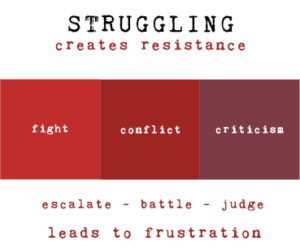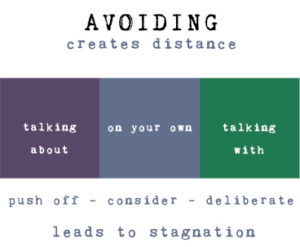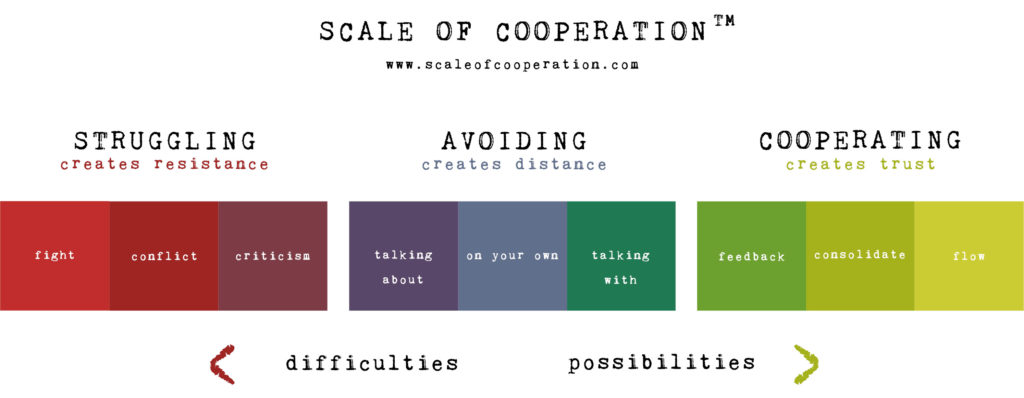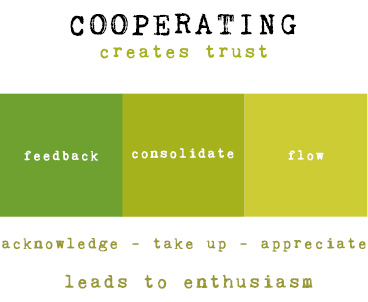The Scale of Cooperation – The Roadmap for Team Development
The Scale of Cooperation – The Roadmap for Team Development
We all know that the atmosphere in a team can be very different. What are the underlying reasons for this? Why can one team handle almost everything and another team has difficulty with changes and functions in expressing annoyances?
Most models are about personal leadership and there is much to be gained with that. However, as soon as you highlight the group dynamics aspects in a team, another level becomes visible. With tough laws that determine whether a team will be successful.
Welcome to the world of team development. The key to group success.

The key to the scale is a division into three ‘worlds’ between which each collaboration moves: Struggling, Avoiding and Cooperation. They are three “worlds”, all three of which have “some sort of attraction”. By making this visible in a group process, it becomes possible to reinforce or let go of behaviour.
Think of the three worlds as three houses. You need a key to access it. For a cooperative ‘world’ there are three keys that stand out: acknowledge, take up and appreciate. It doesn’t really matter what key you come in with, you do need all three from time to time. Acknowledge is about the willingness to develop yourself, to acknowledge mistakes made by yourself: “OK, I can improve myself!” Take up is about doing what you promise. Appreciate is about giving back to each other that makes you happy and satisfied. It is then energy again to be able to take an extra step for ALL.
A Roadmap
This roadmap is a simplification of reality – and that’s what makes it such a useful method in order to obtain insight into where a group stands, and then through thinking about what the first step could be to help the group cooperate more effectively.

Anyone who enters a house with the key to escalation, battle and judgment actually knows that ‘housemates’ will respond to this. Resistances arise, and before you know it: the house is called ‘Struggling’.
Struggling: you’re under pressure, you push back. It is win-or-lose, you or me. You’re mainly against something, and you want others to stop on their route and follow you in order to achieve your goal.
- You may not want to just survive (just fight gives space for positive/negative interpretation) / you may not want to focus on just fighting.
- Furthermore, you may have doubts, and you think about the direction and process you are in, about the details that are not yet clear to them (to whom? This is a bit foggy).
- You are not allowed to cooperate (yet or anymore).
The first step is to come together and share experience without any judgement. You need one of the Cooperating ‘house keys’: “This is where I am at the moment and this is what happened to me. This is my goal. Where are you now? Can we work together?” With an open mind that is respectful and to the point, the feedback and conscious learning process starts immediately and without limitations. Top teams know that. Become one of the leading ones!

Avoiding: this is the most fascinating of the three ‘worlds’, for the people in it don’t usually show why they choose to be on their own:
- you may not want to just fight
- you may have doubts and think about the direction and process you are in, about details that are not yet clear to them
- you may not have a clear goal
- you are not allowed to cooperate (anymore)
- or you are working so hard that you don’t have time for meaningless discussions

Cooperation means sharing, mutual appreciation and acknowledgement, having a joint goal, making use of each other’s qualities, learning from and with each other, and finding win-win solutions together. The first step is to come together and share experience without any judgement. “This is where I am and what happened to me. This is my goal. Where are you? Can we work together?” With an open mind respectful and to the point the feedback and learning process starts immediately and without borders. Top teams know that. Become a top team!
Let us know what you need in your circumstances and taking into account your (organizational) culture.
